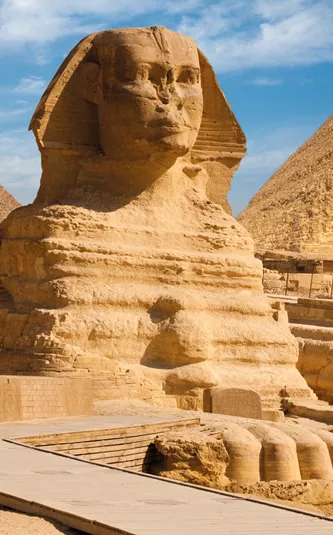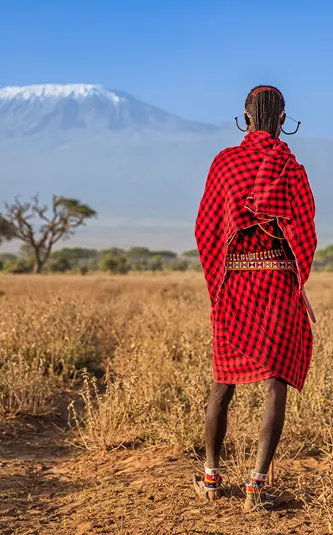© Adventure World 2024. All Rights Reserved.
MAKE TRAVEL MATTER® is a trademark of The TreadRight Foundation, registered in the U.S. and other countries and regions, and is being used under license.
Travel tips
Spring
Mar-May
Average temperature:
23°C
Rainfall:
Under 5 mm/month, mostly in the north, occasional sandstorms in April.
Summer
Jun-Aug
Average temperature:
30°C but can be up to 40°C
Rainfall:
None
Autumn
Sep-Nov
Average temperature:
25°C
Rainfall:
Minimal, with slight increases in the north by November.
Winter
Dec-Feb
Average temperature:
16°C
Rainfall:
Up to 30mm/month along the Mediterranean coast, almost none inland.
Country dialing code
+20
Capital city
Cairo
Official language
Arabic
Currency
Egyptian Pound (EGP)
The best time to visit Egypt is during the cooler months from October to April, when the weather is mild. As many of Egypt’s main attractions are outdoors, it’s the perfect time for sightseeing and wandering ancient sites, especially in cities like Cairo, Luxor and Aswan.
Highlights
Pyramids of Giza
The Pyramids of Giza, near Cairo, are ancient wonders built over 4,500 years ago. These monumental tombs, including the Great Pyramid, reflect Egypt’s architectural genius and spiritual legacy.
Abu Simbel
Abu Simbel features two colossal temples carved into rock by Ramses II. Located near Egypt’s southern border, they’re famed for their grandeur and the incredible relocation to save them from flooding.
Valley of the Kings
Located on Luxor’s west bank, the Valley of the Kings is a royal burial ground for pharaohs like Tutankhamun. Its richly decorated tombs reveal secrets of Ancient Egypt’s beliefs and artistry.
Cairo
Cairo is one of the oldest cities in the world. Explore the National Museum of Egyptian Civilization, and wander the maze of Khan el Khalili bazaar for spices, crafts and a taste of local life and culture.
Alexandria
Founded by Alexander the Great, Alexandria is a Mediterranean gem. Once home to the Great Library, it now offers Roman ruins, seaside charm, and a unique blend of Egyptian and Greco-Roman heritage.
Nile River
The Nile River, the lifeblood of Egypt, flows over 6,600km through deserts and cities. A four-night river cruise reveals temples, villages and timeless landscapes that have sustained civilizations for millennia.
Useful information
Your search for ""
clear searchCommunications
Country Code for Egypt: +20
Official Travel advice:
Egypt Travel Advice & Safety | Smartraveller (Australia)
Egypt | SafeTravel NZ (New Zealand)
Ambulance: 123 Fire: 180 or 123 Police: 122 or 123
Australian Embassy, Cairo
11th floor, World Trade Centre, 1191 Corniche el Nil, Boulac, Cairo, Egypt
Phone: +20 2 2770 6600 Website: egypt.embassy.gov.au
New Zealand Embassy Egypt
8th floor, North Tower, Nile City Towers, Corniche El Nil, Ramlet Beaulac
Telephone: +202 2461 9186
Email: enquiries@nzembassy.org.eg
Customs
Egypt is an Arabic country and has Arabic customs. The Egyptians are deeply religious, and religious principles govern their daily lives. You should always dress modestly in Egypt but especially when visiting mosques or rural areas. Men and women should wear lightweight, loose-fitting clothing that covers shoulders and knees.
When greeting locals, a warm smile and a simple “Salam Alaikum” (peace be upon you) is a great start. Handshakes are common between men, but between men and women, it’s best to wait and see if the woman extends her hand first. In homes and some religious sites, it’s important to remove your shoes before entering. Always follow the host’s lead or check with your guide.
If travelling during Ramadan, be mindful that many Egyptians fast from dawn to sunset, so eating or drinking in public during daylight hours should be done discreetly. Year-round, Friday is the Islamic holy day, like Sunday in Christian cultures. Many businesses close or have reduced hours, and the Friday noon prayer is significant.
Electricity
Electrical Socket type: Type C and Type F
Voltage: 220-240 volts
Health
The following information is intended as a guide only and in no way should it be used as a substitute for professional medical advice relative to a traveller's individual needs and vaccination history. No guarantee is made as to its accuracy or thoroughness. For further information, please contact The Travel Doctor.
Waterborne, foodborne and other infectious diseases are common. To protect yourself from illness, drink boiled water or bottled water with sealed lids, don't swim in freshwater and avoid contact with dogs and cats.
Insect-borne diseases: There have been limited dengue and malaria outbreaks in recent years. To protect yourself from insect-borne disease, make sure your accommodation is insect-proof, use insect repellent and wear long, loose, light-coloured clothing.
Air pollution: Cairo regularly experiences extremely high levels of air pollution and dust. If you suffer from breathing difficulties or a lung condition, discuss this with your doctor prior to travel.
Official Travel advice:
Egypt Travel Advice & Safety | Smartraveller (Australia)
Egypt | SafeTravel NZ (New Zealand)
How to Get There & Getting Around
Most travellers arrive in Egypt via Cairo International Airport, the country’s main hub. There are also international airports in Luxor, Hurghada and Sharm El Sheikh serving regional and resort destinations.
Once in Egypt, getting around is quite easy thanks to a variety of transport options. Domestic flights are the quickest way to cover long distances, especially between Cairo and southern cities like Luxor or Aswan.
Within cities, taxis are common but be sure to agree on a fare in advance or use apps like Uber and Careem.
Holidays & Festivals
- February-March: Ramadan A sacred month of fasting, prayer and reflection observed by Muslims from dawn to sunset.
- March-April: Eid al-Fitr: A joyful festival marking the end of Ramadan, celebrated with feasts, prayers and giving to charity.
- 21 April: Sham El Nessim: An ancient spring festival celebrated by all Egyptians with picnics, salted fish and outdoor gatherings.
- June-July Islamic New Year (Hijri New Year): Marks the beginning of the Islamic lunar calendar, observed with quiet reflection and prayer.
- 5 September: Prophet Muhammad’s Birthday (Moulid El-Nabi):
A religious celebration with processions, sweets, and storytelling about the Prophet’s life.
Language
Arabic
Money, Tipping & Shopping
The preferred currency in Egypt is the Egyptian Pound (EGP), and it’s best to carry cash for everyday purchases, especially in markets, small shops, and rural areas. Major hotels, upscale restaurants, and some tourist shops will accept credit cards. ATMs are widely available in cities.
When it comes to tipping, or “baksheesh,” it’s a deeply ingrained part of Egyptian culture. Small tips are expected for services such as hotel porters, drivers, guides, and even restroom attendants, typically ranging from EGP 5 to 20 depending on the service. In restaurants, a 10–15% tip is customary if service isn’t already included in the bill. For private or small group tours, tip around EGP 100–200 per person per day (approximately US$3–6).
Egypt offers a vibrant mix of traditional markets (souks) and modern malls. Bargaining is common in bazaars like Khan el-Khalili in Cairo, where you can shop for spices, perfumes, jewellery, hand-blown glass and textiles. Popular souvenirs include papyrus art, alabaster figurines, cartouche jewellery and handmade carpets. Always compare prices and don’t hesitate to bargain as it’s expected.
Visas
The Travel Corporation has partnered with the company Sherpa to provide travellers with the latest government and health restrictions. Simply enter the country you want to travel to for information on safety regulations, border closures, quarantine requirements, your travel visa and more using the Sherpa travel tool: Visa Advice
You need a visa for Egypt if you have an Australian or New Zealand passport: Egypt Electronic Visa Portal or you can obtain a visa on arrival. You must have a non-Egyptian credit card or US Dollars in cash to get a visa on arrival - ensure you have the required amount as ATMs may not disperse USD or other foreign currency.
Official Travel advice:
Egypt Travel Advice & Safety | Smartraveller (Australia)
Egypt | SafeTravel NZ (New Zealand)








